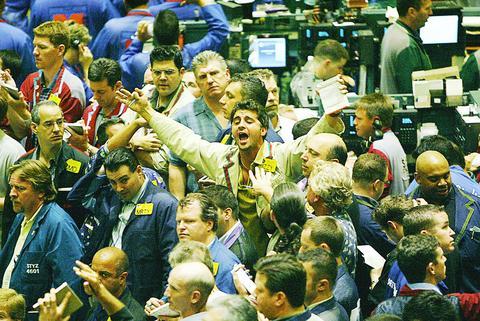US oil prices hit new record levels above US$44 a barrel yesterday after the head of OPEC said there was little the group could do to cool red-hot markets.
US light crude rose US$0.42 to US$44.24 a barrel, marking the highest level since crude futures were launched on the New York Mercantile Exchange in 1983. It later fell to trade around US$44.05.

PHOTO: AP
London's Brent crude peaked at US$40.45 a barrel, its highest since the run-up to the first Gulf War.
Oil prices have surged by more than one-third since the end of last year on worries that accelerating global demand has left supplies tightly stretched with little leeway for disruption.
OPEC president Purnomo Yusgiantoro said yesterday that the cartel, which represents about 35 percent of the world's oil supply, had no spare oil to hand to dampen prices.
"The oil price is very high, it's crazy. There is no additional supply," Purnomo said in Jakarta.
"Minister Naimi has said Saudi Arabia can increase production but they cannot do it immediately," he said, referring to Ali al-Naimi, oil minister for Saudi Arabia, the world's No. 1 exporter.
Saudi Arabia has said it would produce 9.5 million barrels per day (bpd) this month, which would be just 1 million bpd below its full capacity. OPEC said last month that it would increase its surplus production capacity by a million barrels per day to 3.5 million in the short term.
Bailiffs have given Russia's largest oil company, Yukos, one month to pay back taxes, but the company said on Monday that the Tax Ministry had begun an investigation into its 2002 accounts.
Yukos owes almost US$7 billion in back taxes for 2000 and 2001 and analysts have said any bills for later years could bring the total towards US$10 billion.
It pumps one-fifth of production in Russia, the No.2 supplier after Saudi Arabia, but has had its bank accounts and assets frozen, raising fears that its sales may dry up at a time when global production is running close to full tilt.
"Stronger-than-expected demand has eaten into world spare capacity, which has been eaten into further by problems in Iraq. Now there is the uncertainty of Yukos," said David Thurtell, commodities strategist at Common-wealth Bank of Australia.
Industry estimates indicate that OPEC is pumping close to 30 million bpd of crude for the first time since 1979. The group, which raised its official production limits to 26 million bpd on Aug. 1, has been producing way over its self-imposed ceiling to try and dampen soaring prices.

The CIA has a message for Chinese government officials worried about their place in Chinese President Xi Jinping’s (習近平) government: Come work with us. The agency released two Mandarin-language videos on social media on Thursday inviting disgruntled officials to contact the CIA. The recruitment videos posted on YouTube and X racked up more than 5 million views combined in their first day. The outreach comes as CIA Director John Ratcliffe has vowed to boost the agency’s use of intelligence from human sources and its focus on China, which has recently targeted US officials with its own espionage operations. The videos are “aimed at

STEADFAST FRIEND: The bills encourage increased Taiwan-US engagement and address China’s distortion of UN Resolution 2758 to isolate Taiwan internationally The Presidential Office yesterday thanked the US House of Representatives for unanimously passing two Taiwan-related bills highlighting its solid support for Taiwan’s democracy and global participation, and for deepening bilateral relations. One of the bills, the Taiwan Assurance Implementation Act, requires the US Department of State to periodically review its guidelines for engagement with Taiwan, and report to the US Congress on the guidelines and plans to lift self-imposed limitations on US-Taiwan engagement. The other bill is the Taiwan International Solidarity Act, which clarifies that UN Resolution 2758 does not address the issue of the representation of Taiwan or its people in

US Indo-Pacific Commander Admiral Samuel Paparo on Friday expressed concern over the rate at which China is diversifying its military exercises, the Financial Times (FT) reported on Saturday. “The rates of change on the depth and breadth of their exercises is the one non-linear effect that I’ve seen in the last year that wakes me up at night or keeps me up at night,” Paparo was quoted by FT as saying while attending the annual Sedona Forum at the McCain Institute in Arizona. Paparo also expressed concern over the speed with which China was expanding its military. While the US

SHIFT: Taiwan’s better-than-expected first-quarter GDP and signs of weakness in the US have driven global capital back to emerging markets, the central bank head said The central bank yesterday blamed market speculation for the steep rise in the local currency, and urged exporters and financial institutions to stay calm and stop panic sell-offs to avoid hurting their own profitability. The nation’s top monetary policymaker said that it would step in, if necessary, to maintain order and stability in the foreign exchange market. The remarks came as the NT dollar yesterday closed up NT$0.919 to NT$30.145 against the US dollar in Taipei trading, after rising as high as NT$29.59 in intraday trading. The local currency has surged 5.85 percent against the greenback over the past two sessions, central